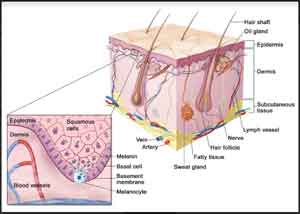- Home
- Editorial
- News
- Practice Guidelines
- Anesthesiology Guidelines
- Cancer Guidelines
- Cardiac Sciences Guidelines
- Critical Care Guidelines
- Dentistry Guidelines
- Dermatology Guidelines
- Diabetes and Endo Guidelines
- Diagnostics Guidelines
- ENT Guidelines
- Featured Practice Guidelines
- Gastroenterology Guidelines
- Geriatrics Guidelines
- Medicine Guidelines
- Nephrology Guidelines
- Neurosciences Guidelines
- Obs and Gynae Guidelines
- Ophthalmology Guidelines
- Orthopaedics Guidelines
- Paediatrics Guidelines
- Psychiatry Guidelines
- Pulmonology Guidelines
- Radiology Guidelines
- Surgery Guidelines
- Urology Guidelines
Adjuvant nivolumab superior to ipilimumab in surgically resected stage III/IV melanoma

Adjuvant nivolumab is superior to standard of care ipilimumab in patients with surgically resected stage III/IV melanoma who are at high risk of relapse, according to late-breaking results from the CheckMate 238 trial presented today at the ESMO 2017 Congress in Madrid and published in the New England Journal of Medicine(NEJM). The anti-programmed death-1 (PD-1) antibody nivolumab led to better relapse-free survival, with fewer side effects than ipilimumab.
Adjuvant therapy is given after initial cancer treatment with the goal of preventing metastases. Drugs that are effective in metastatic disease may be given as adjuvant therapy to patients who have been surgically resected of their disease and are at high risk of relapse.
Nivolumab and ipilimumab are immune checkpoint inhibitors approved for metastatic melanoma. Ipilimumab is also the Food and Drug Administration (FDA)-approved standard of care adjuvant therapy for resected stage III melanoma in the US. Nivolumab was well tolerated and showed promising survival results when investigated as adjuvant therapy in a pilot study of 33 patients with resected stage IIIC and IV melanoma. (3)
The benefit shown for nivolumab in metastatic disease and those pilot data provided the impetus for CheckMate 238, a randomised, double-blind, phase III trial comparing adjuvant treatment with nivolumab versus standard of care ipilimumab. The trial included 906 patients with stages IIIB, IIIC, and IV resected melanoma who had a greater than 50% risk of relapse over five years. Patients were randomised 1:1 to either treatment.
The primary endpoint was relapse-free survival. Overall survival was a secondary endpoint which will be complicated by the anticipation that patients will cross over to the alternative drug upon relapse.
The trial was stopped early by the data safety monitoring committee due to clear evidence of benefit for nivolumab. The planned interim analysis which occurred at a minimum follow-up of 18 months, presented today, shows that the rate of relapse-free survival was significantly improved with nivolumab (66.4%) compared to ipilimumab (52.7%), with a hazard ratio of 0.65 (p < 0.0001). There were similar results across prespecified subgroups of patients.
There were fewer treatment-related, clinically relevant side effects (grade 3/4) in the group treated with nivolumab (14%) compared to those treated with ipilimumab (46%). Just 10% of patients taking nivolumab had to stop treatment due to side effects compared to 43% taking ipilimumab.
First author Dr Jeffrey Weber, deputy director, Perlmutter Cancer Center, NYU Langone Health, New York, USA, said: "The results clearly show that relapse-free survival is more favourable with nivolumab. The majority of patients had higher risk disease than in most prior adjuvant melanoma trials, which makes the findings even more encouraging."
"A previous trial found that ipilimumab had a significant relapse-free and overall survival advantage compared to placebo," continued Weber. (4) "CheckMate 238 shows that nivolumab is superior to ipilimumab, so extrapolating these results, nivolumab is far better than no adjuvant treatment for high-risk melanoma. It is also much less toxic than ipilimumab."
He concluded: "Nivolumab looks like a superior adjuvant melanoma regimen compared to ipilimumab from every angle. It leads to better relapse-free survival, has fewer side effects, and is well tolerated."
Professor John Haanen, head, Division of Medical Oncology, Netherlands Cancer Institute, Amsterdam, the Netherlands, said: "An adjuvant trial presented at the ESMO 2016 Congress showed that ipilimumab gave an overall survival advantage over placebo but it was highly toxic. In the US it has become standard of care but this is still being debated in Europe."
Commenting on the findings presented today, he said: "The results of CheckMate 238 are very exciting. They show for the first time that an anti-PD-1 drug is superior in the adjuvant setting and because of its lower toxicity nivolumab is much easier to give than ipilimumab. The same occurs in the metastatic setting where anti-PD-1 treatment is more efficacious and has a much better safety profile and has replaced ipilimumab as first line treatment."
Another anti-PD-1 drug, pembrolizumab, is being tested as adjuvant therapy against placebo in patients with resected stage III melanoma in a phase III European Organisation for Research and Treatment of Cancer (EORTC) trial. Haanen said: "If relapse-free survival is better with pembrolizumab, it is likely that adjuvant anti-PD-1 will become standard of care for high-risk melanoma in the near future, provided an overall survival benefit is also shown."

Disclaimer: This site is primarily intended for healthcare professionals. Any content/information on this website does not replace the advice of medical and/or health professionals and should not be construed as medical/diagnostic advice/endorsement or prescription. Use of this site is subject to our terms of use, privacy policy, advertisement policy. © 2020 Minerva Medical Treatment Pvt Ltd